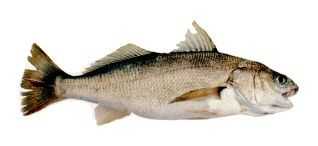White Croaker

Species Details
Genyonemus Lineatus
Sciaenidae
Perciformes
Nearshore, Offshore, Bays
0 - 1 lbs.
8" - 16"
White Croaker (Genyonemus lineatus) Fish Description
The White Croaker is a small to medium-sized saltwater fish that has a brown to yellow color with a silvery bottom and has an elongated body. To help differentiate it from the closely-resembled relative the yellowfin croaker, the white croaker has a black spot under its pectoral fin. They also have 12 to 15 dorsal spines (most croakers don’t exceed 11).
Like its relative the yellowfin croaker, the white croaker is a bottom feeder fish that eats a variety of fishes, shrimps, squids, worms, crabs, clams, and even octopi. They even eat carcasses if given the opportunity.
Interesting Facts About the White Croaker
- Unlike its other croaker relatives, the white croaker lacks barbels which also helps it differentiate from its cousins.
- Like other croakers, they can make “croaking” sounds with their swim bladders, hence the name croaker.
- Some areas of California do not advise to eat white croaker since they have high contaminants of DDTs and PCBs. They’re also known as fatty fish, which makes them more dangerous to eat since their fatty tissues help build up DDTs and PCBs. Areas not advisable to eat white croakers are Cabrillo Pier, San Pedro/ White Point, Horshoe Kelp, Pier J and Belmont Pier, Palos Verdes Pt., and Pt. Vicente
Size
The biggest white croaker caught was 16.3 inches and the heaviest was 1 lb and 6 ½ oz. On average, white croakers are only 8 to 9 inches and weigh less than a pound.
Habitat and Distribution
The white croaker is mostly found in the eastern Pacific waters of the U.S. They thrive in offshore, bays, and nearshore waters. The white croaker’s range is from Magdalena Bay, Baja California, Vancouver Islands, and British Columbia. They can also be found in the waters of San Francisco but they are not plenty there. Famous fishing spots for this game fish are located in Salsipuedes Creek, Santa Cruz Pier, Borregas Creek, and Soquel Cove.
They prefer shallow depths of 10 to 100 feet (but some were found at 660 feet) and mostly dwells at the bottom muddy area where they can hunt and hide. The spawning season of the white croaker is from November to April, but it peaks from February to March.
Fishing Techniques
Beginner anglers can practice their skills with croakers since they are plenty and you can fish them throughout the year. In fact, they are so plenty that anglers consider them as a nuisance. You can fly fish white croakers by the beach, kayaking, or by the piers. Since they are bottom dwellers, it’s best to target the bottom of the waters. Try to cast 40-50 feet by the beach or pier and wait for the fish to take your bait. Once they’re hooked they don’t fight much or not at all.
The fly fish gear recommended by anglers is a 9ft rod of 6 to 8 weight. They have small mouths so use hook sizes of # 4 to 2. Use a leader of 4 to 8 feet in length with 8 to 15 lbs test monofilament wire. Get sinking lines of 3 to 6 ips and Add 1-2 oz of sinkers to help you to get your desired depth.
Recommended lures for the white croaker is the clouser deep minnow, crab fly patterns, shrimp fly patterns. Anglers have had more success by using brightly colored lures, like chartreuse color. For baits, the best recommendation is a squid. You can also use ghost shrimps and worms, but this game fish is known to eat anything so you can try a variety of baits that you have.







